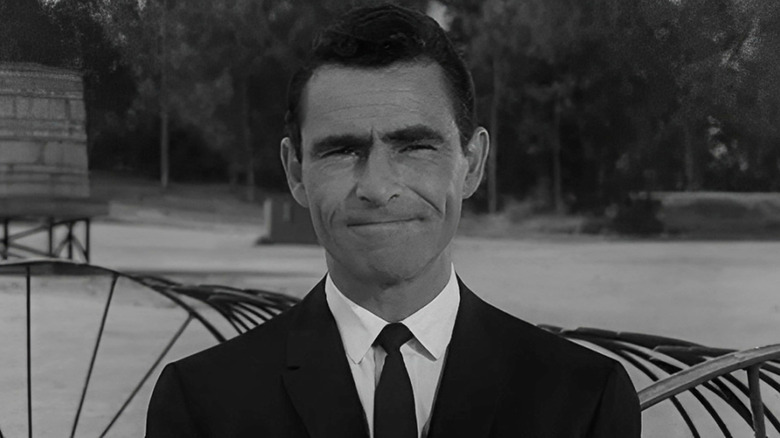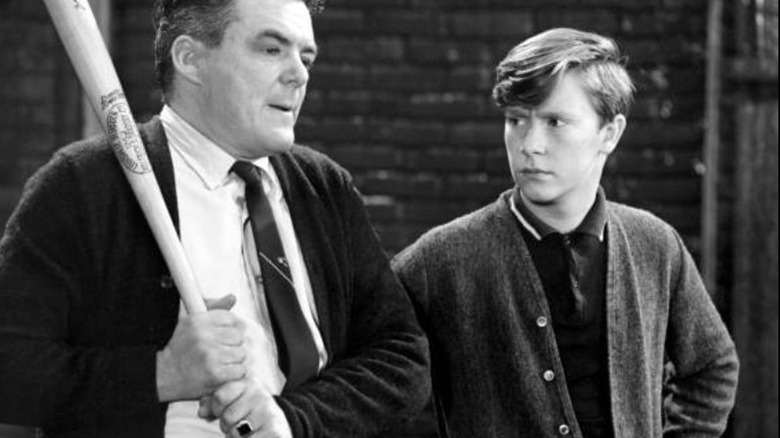The Forgotten '60s Sitcom That Kicked The Twilight Zone Off TV
Rod Serling's "The Twilight Zone" was not renewed after five seasons, and while the final seasons weren't as compelling as the entries in its initial run, the series is still lauded for its groundbreaking impact on sci-fi-centered anthology television. One of the reasons behind the show's decline in narrative integrity and audience appeal can be attributed to burnout, as Serling became exhausted from having to write fresh material in addition to serving as the series' host and executive producer. This kind of burnout was natural, as Serling had contributed to 48 scripts throughout the show's first three seasons. Then, by the time season 4 was about to premiere, something unexpected happened.
"The Twilight Zone" relied on sponsors like any other television series at the time, but it was unable to find one in 1962. According to Mark Scott Zicree's "The Twilight Zone Companion," this delay in securing a sponsor on time came at a heavy cost, as CBS unceremoniously decided to run a new series in the same time slot for the season 4 premiere of Serling's show. This new slotted series was titled "Fair Exchange," which ended up pushing "The Twilight Zone" completely off the air for some time. Per Zicree's book, this decision was not discussed with Serling or his crew, which led them to "frantically [attempt] to work out some kind of deal with CBS so that the series could remain on television."
What was "Fair Exchange" about? No, it was not a science fiction show, nor was it an anthology series — it was an hour-long comedy that followed the sitcom structure. While "The Twilight Zone" returned eventually for two more seasons, this sudden insertion caused a ton of backend problems and eventually led to decreased involvement from Serling himself, who only became more disillusioned with time.
How Fair Exchange booted The Twilight Zone off TV
Apart from the fact that it replaced Serling's anthology, "Fair Exchange" was quite an anomaly at the time. It was one of the first full-hour television sitcoms that experimented with its structure, which garnered positive early reviews but failed to capture its audience's attention. The story follows two World War II veterans whose daughters decide to live with the other's family, leading to shenanigans that are both comical and heartbreaking. While "Fair Exchange" might have fared better under different circumstances, the show's longevity was decidedly shortlived as it failed to meet audience expectations and was eventually canceled.
When the replacement happened abruptly, "The Twilight Zone" producer Buck Houghton was out of a job, with the series' future undecided, and received several offers from Four Star Productions (now known as Four Star Television). Although Houghton had received similar offers before, he decided to "stick with" Serling as the series' brilliance hinged on the latter, although the sudden replacement of the show forced him to reconsider. Eventually, Houghton joined Four Star, and Serling busied himself with other endeavors in the meantime.
Everything changed when the series returned in January 1963 for its fourth season, but with each episode only half an hour in length now. In an ironic turn of events, the show that Serling's anthology ended up reclaiming — now retitled "Twilight Zone" — was none other than "Fair Exchange." With Houghton not being a part of the team anymore, CBS brought on producer Herbert Hirschman to supervise the remainder of the seasons.
While this new rebranding brought "The Twilight Zone" back on the menu, the half-hour restriction added to Serling's creative burnout. The stories were just not the same anymore, and the series dwindled until it ended with a fifth and final season.

